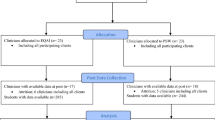Abstract
Increasingly, research is focusing on strategies to make evidence-based practice more achievable in school mental health. A significant theme is training and implementation of “common elements” or specific therapeutic skills associated with positive clinical outcomes for children and youth, as compared to “manualized” interventions, which can be difficult to implement, especially in the school setting. As part of a larger study on quality assessment and improvement and evidence-based practice in school mental health (SMH) in three US states, this study analyzed 29 SMH clinicians’ knowledge and use of common elements and the relation of knowledge and use to independent ratings of therapy quality. There was high variability in knowledge and use of the common elements and strong associations between knowledge and use and ratings of treatment quality/effectiveness. Results are discussed in relation to advancing research and clinical practice on achievable evidence-based practice in SMH.
Similar content being viewed by others
References
Andis, P., Cashman, J., Praschil, R., Oglesby, D., Adelman, H., Taylor, L., et al. (2002). A strategic and shared agenda to advance mental health in schools through family and system partnerships. International Journal of Mental Health Promotion, 4, 28–35.
Armbruster, P., Gerstein, S., & Fallon, T. (1997). Bridging the gap between service need and service utilization: A school-based mental health program. Community Mental Health Journal, 33, 199–211. doi:10.1023/A:1025033326743.
Armbruster, P., & Lichtman, J. (1999). Are school based mental health services effective? Evidence from 36 inner city schools. Community Mental Health Journal, 35, 493–504. doi:10.1023/A:1018755100381.
Barwick, M. (2010). Master’s level clinician competencies in evidence-based behavioral healthcare. Toronto, ON: Hospital for Sick Children/Evidence Based Practice Consortium.
Becker, K. & Stephan, S. (2010). Development and initial findings of the practice elements and behavioral observation system. Paper presented at the 3rd annual national institutes of health conference on dissemination and implementation: methods and measurement, Bethesda, MD.
Borntrager, C. F., Chorpita, B. F., Higa-McMillan, C. K., Weisz, J. R., & The Research Network on Youth Mental Health. (2009). Provider attitudes towards evidence-based practices: Are the concerns with the evidence or with the manuals? Mental Health Services Research, 60, 677–681. doi:10.1176/appi.ps.60.5.677.
Brener, N., Martindale, J., & Weist, M. (2001). Mental health and social services: Results from the School Health Policies and Programs Study 2000. Journal of School Health, 71, 305–312. doi:10.1111/j.1746-1561.2001.tb03507.x.
Chorpita, B. F., Becker, K. D., & Daleiden, E. L. (2007). Understanding the common elements of evidence-based practice: Misconceptions and clinical examples. Journal of the American Academy of Child and Adolescent Psychiatry, 46(5), 647–651. doi:10.1097/chi.0b013e318033ff71.
Chorpita, B., & Daleiden, E. (2007). Evidence-based services committee–Biennial report–Effective psychological interventions for youth with behavioral and emotional needs. Honolulu, HI: Hawaii Department of Health, Child and Adolescent Mental Health Division.
Chorpita, B. F., & Daleiden, E. L. (2009). 2009 CAMHD Biennial Report: Effective psychosocial intervention for youth with behavioral and emotional needs. Honolulu, HI: Hawaii Department of Health, Child and Mental Health Division.
Chorpita, B. F., Daleiden, E. L., & Weisz, J. R. (2005a). Identifying and selecting the common elements of evidence based interventions: A distillation and matching model. Mental Health Services Research, 7(1), 5–20. doi:10.1007/s11020-005-1962-6.
Chorpita, B. F., Daleiden, E. L., & Weisz, J. R. (2005b). Modularity in the design and application of therapeutic interventions. Applied & Preventive Psychology, 11(3), 141–156. doi:10.1016/j.appsy.2005.05.002.
Chorpita, B. F., & Nakamura, B. J. (2004). Four considerations for dissemination of intervention innovations. Clinical Psychology-Science and Practice, 11(4), 364–367. doi:10.1093/clipsy/bph093.
Chorpita, B. F., & Weisz, J. R. (2009). MATCH-ADTC: Modular approach to therapy for children with anxiety, depression, trauma or conduct problems. Satellite Beach, FL: PracticeWise, LLC.
Cohen, J. (1988). Statistical power analysis for the behavioral sciences (2nd ed.). Hillsdale: Lawrence Erlbaum.
Elias, M. J. (1997). Reinterpreting dissemination of prevention programs as widespread implementation with effectiveness and fidelity. In R. P. Weissberg & T. P. Gullotta (Eds.), Healthy children 2010: Establishing preventive services. Issues in children’s and families’ lives, (Vol. 9, pp. 253–289). Thousand Oaks, CA: Sage.
Essau, C. A. (2005). Frequency and patterns of mental health services utilization among adolescents with anxiety and depressive disorders. Depression and Anxiety, 22(3), 130–137. doi:10.1002/da.20115.
Evans, S. W. (1999). Mental health services in schools: Utilization, effectiveness and consent. Clinical Psychology Review, 19, 165–178. doi:10.1016/S0272-7358(98)00069-5.
Evans, S. W., & Weist, M. D. (2004). Implementing empirically supported treatments in the schools: What are we asking? Clinical Child and Family Psychology Review, 7, 263–267. doi:10.1007/s10567-004-6090-0.
Flaherty, L. T., & Weist, M. D. (1999). School-based mental health services: The Baltimore models. Psychology in the Schools, 36, 379–389. doi:10.1002/(SICI)1520-6807(199909)36:5<379:AID-PITS2>3.0.CO;2-D.
Flaspohler, P., Anderson-Butcher, D., Paternite, C., Weist, M., & Wandersman, A. (2006). Community science and expanded school mental health: Bridging the research to practice gap to promote child well being and academic success. Educational and Child Psychology, 23(1), 27–41.
Foster, S., Rollefson, M., Doksum, T., Noonan, D., & Robinson, G. (2005). School Mental Health Services in the United States, 2002–2003 (DHHS Publication No. SMA 05-4068). Rockville, MD: Center for Mental Health Services, Substance Abuse and Mental Health Services Administration.
Guyatt, G., & Rennie, D. (Eds.). (2002). Users’ guides to the medical literature. Chicago: American Medical Association Press.
Hoge, M., Morris, J., Daniels, A., Stuart, G., Huey, L., Adams, N., et al. (2007). An action plan for behavioral health workforce development. Report prepared by the Annapolis coalition on the behavioral health workforce for the substance abuse and mental health services administration, US Department of Health and Human Services.
Huang, L., Macbeth, G., Dodge, J., & Jacobstein, D. (2004). Transforming the workforce in children’s mental health. Administration and Policy in Mental Health and Mental Health Services Research, 32(2), 167–187. doi:10.1023/B:APIH.0000042745.64582.72.
Hunter, L., Hoagwood, K., Evans, S., Weist, M., Smith, C., Paternite, C., et al. (2005). Working together to promote academic performance, social and emotional learning, and mental health for all children. New York, NY: Center for the Advancement of Children’s Mental Health at Columbia University.
Jennings, J., Pearson, G., & Harris, M. (2000). Implementing and maintaining school-based mental health services in a large, urban school district. Journal of School Health, 70(5), 201–206. doi:10.1111/j.1746-1561.2000.tb06473.x.
Jensen, P., & Foster, M. (2010). Closing the research to practice gap in children’s mental health: Structures, solutions, and strategies. Administration and Policy In Mental Health, 37, 111–119. doi:10.1007/s10488-010-0286-z.
Lever, N., Chambers, K., Stephan, S., Page, M., & Ghunney, A. (2010). National survey on expanded school mental health services. Advances in school mental health promotion, 3(4), 38–50. doi:10.1080/1754730X.2010.9715690.
Lever, N., Stephan, S., Axelrod, J., & Weist, M. (2004). Fee-for-service revenue for school mental health through a partnership with an outpatient mental health center. Journal of School Health, 74(3), 91–94. doi:10.1111/j.1746-1561.2004.tb04210.x.
Merikangas, K., He, J., Burstein, M., Swanson, S., Avenevoli, S., Cui, L., et al. (2010). Lifetime prevalence of mental disorders in US adolescents. Results from the national comorbidity survey replication-adolescent supplement (NCS-A). Journal of the American Academy of Child and Adolescent Psychiatry, 49(1), 980–989. doi:10.1016/j.jaac.2010.05.017.
Nabors, L. A., & Reynolds, M. W. (2000). Program evaluation activities: Outcomes related to treatment for adolescents receiving school-based mental health services. Children’s Services: Social Policy, Research, and Practice, 3, 175–189. doi:10.1207/S15326918CS0303_4.
Paternite, C., Weist, M., Axelrod, J., Weston, K., & Anderson-Butcher, D. (2006). School mental health workforce issues. In M. Hoge, J. Morris, A. Daniels, N. Adams, L. Huey, & G. Stuart (Eds.), A thousand voices: The national action plan on behavioral health workforce development (pp. 199–210). Rockville, MD: US substance abuse and mental health services administration.
Rones, M., & Hoagwood, K. (2000). School-based mental health services: A research review. Clinical Child and Family Psychology Review, 3, 223–241. doi:10.1023/A:1026425104386.
Schaeffer, C., Bruns, E., Weist, M., Stephan, S. H., Goldstein, J., & Simpson, Y. (2005). Overcoming challenges to using evidence-based interventions in schools. Journal of Youth and Adolescence, 34(1), 15–22. doi:10.1007/s10964-005-1332-0.
Stephan, S., Wissow, L., & Pichler, E. (2010). Utilizing common factors and practice elements to improve mental health care by school-based primary care providers. Emotional and Behavioral Disorders in Youth, 10(4), 81–86.
Stumpf, R. E., Higa-McMillan, C. K., & Chorpita, B. F. (2009). Implementation of evidence-based services for youth: Assessing provider knowledge. Behavior Modification, 33(1), 48–65. doi:10.1177/0145445508322625.
Walrath, C. M., Bruns, E. J., Anderson, K. L., Glass-Siegal, M., & Weist, M. D. (2004). Understanding expanded school mental health services in Baltimore City. Behavior Modification, 28(4), 472–490. doi:10.1177/0145445503259501.
Weare, K. (2000). Promoting mental, emotional and social health, a whole school approach. London: Routledge.
Weist, M. D. (1997). Expanded school mental health services: A national movement in progress. In T. H. Ollendick & R. J. Prinz (Eds.), Advances in clinical child psychology (Vol. 19, pp. 319–352). New York, NY: Plenum.
Weist, M. (2005). Fulfilling the promise of school-based mental health: Moving toward a Public Mental Health Promotion approach. Journal of Abnormal Child Psychology, 33(6), 735–741. doi:10.1007/s10802-005-7651-5.
Weist, M., Evans, S., & Lever, N. (2003). Handbook of school mental health: Advancing practice and research. New York, NY: Kluwer Academic/Plenum Publishers.
Weist, M., & Ghuman, H. (2002). Principles behind the proactive delivery of mental health services to youth where they are. In H. Ghuman, M. D. Weist, & R. Sarles (Eds.), Providing mental health services to youth where they are: School- and community-based approaches. New York, NY: Taylor & Francis.
Weist, M., Lever, N., Stephan, S., Youngstrom, E., Moore, E., Harrison, B., et al. (2009). Formative evaluation of a framework for high quality, evidence-based services in school mental health. School Mental Health, 1(4), 196–211. doi:10.1007/s12310-009-9018-5.
Weist, M. D., Myers, C. P., Hastings, E., Ghuman, H., & Han, Y. L. (1999). Psychosocial functioning of youth receiving mental health services in the schools versus community mental health centers. Community Mental Health Journal, 35, 69–81. doi:10.1023/A:1018700126364.
Weist, M. D., Paskewitz, D. A., Warner, B. S., & Flaherty, L. T. (1996). Treatment outcome of school-based mental health services for urban teenagers. Community Mental Health Journal, 32, 149–157. doi:10.1007/BF02249752.
Weist, M. D., & Paternite, C. E. (2006). Building an interconnected policy-training-practice-research agenda to advance school mental health. Education and Treatment of Children, 29(1), 173–196.
Weist, M., Sander, M., Walrath, C., Link, B., Nabors, L., Adelsheim, S., et al. (2005). Developing principles for best practice in expanded school mental health. Journal of Youth and Adolescence, 34(1), 7–13. doi:10.1007/s10964-005-1331-1.
Weisz, J. R., Chorpita, B. F., Palinkas, L. A., Schoenwald, S. K., Miranda, J., Bearman, S. K., et al. (2011). Testing standard and modular designs for psychotherapy treating depression, anxiety, and conduct problems in youth A randomized effectiveness trial. Archives of General Psychiatry, 69, 274–282. doi:10.1001/archgenpsychiatry.2011.147.
Acknowledgments
This project was funded by the National Institute of Mental Health, US Department of Health and Human Services, #1R01MH71015-01A1; 2003–2007. Additional support for this project was provided by cooperative agreement U45 MC 00174-10-0 from the Office of Adolescent Health, Maternal and Child Health Bureau (Title V, Social Security Act), Health Resources and Services Administration.
Author information
Authors and Affiliations
Corresponding author
Rights and permissions
About this article
Cite this article
Stephan, S., Westin, A., Lever, N. et al. Do School-Based Clinicians’ Knowledge and Use of Common Elements Correlate with Better Treatment Quality?. School Mental Health 4, 170–180 (2012). https://doi.org/10.1007/s12310-012-9079-8
Published:
Issue Date:
DOI: https://doi.org/10.1007/s12310-012-9079-8




